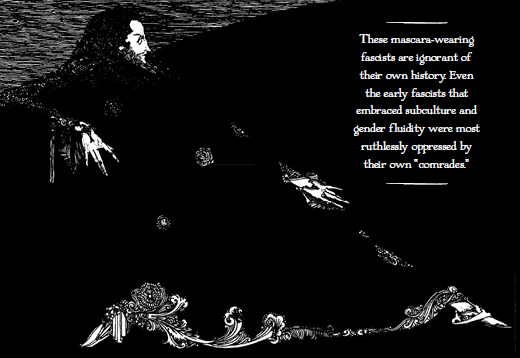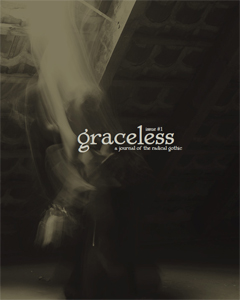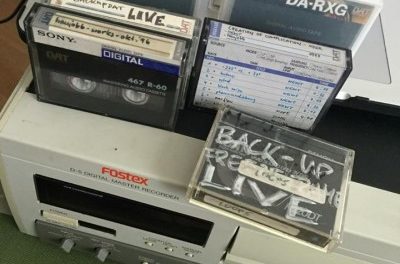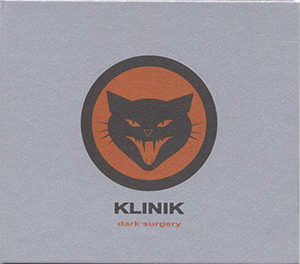“We demand that the goth scene be more than a black-clad reflection of mainstream society.”
I’m sure there were dozens of factors which contributed to the appeal of goth, in all of its expressions, when I first stumbled upon it as a typically clumsy teenager, but looking back, one in particular stands out: the promise it made. The promise of something better, of a more thoughtful, expressive and heartfelt life beyond the suburban parameters I woke up to each morning. My early forays into it – dial-up trawls through newsgroups to which I was too nervous to contribute, tracking down suggested records as though they were panaceas for all of life’s ailments, those first giddy trips to the fog-shrouded nightclubs I’d been hearing about – all bore that promise out. There was more, there was something better, there were other ways to be. I’d found something else and I was home.
But, having been a part of that scene in some shape or form for fifteen years now, and having DJed in it for ten, it’s all too easy to become disillusioned with whatever transformative potential I once saw in it. It’s easy to point to and kvetch about stale records, off the rack fashion, crass commercialism and mindless conformity. And, while I didn’t initially connect my nascent political ideals with my fledgling gothdom (apart from the scene’s apparent acceptance of folks of all sorts), I’m disheartened today when I see the same reactionary, patriarchal bullshit mainstream culture foists upon us reinscribed within a scene that supposedly rejects normative mores (a recurring theme cannier readers of ID:UD may have detected on these very pages). In short, it can be difficult to locate the legitimately alternate modes of thought and living which this scene promised.
Bollocks, says editor Margaret Killjoy and the contributors to the first issue of Graceless: that radical tradition’s been right under your nose this whole time, and if it hasn’t, there’s nothing stopping you from helping to foment it. Assembling under the rallying cry of the “radical gothic”, Killjoy and friends have assembled a collection of interviews, editorials and historical monographs with an eye to the intersection of politics and goth aesthetics (in the broadest terms: film, literature, photography, art and all subgenres of dark music are embraced).

Flipping though Graceless‘ pages, I felt that same rush of hope and possibility in alterity that I first did lo those many years ago. Only a handful of records, concerts, and trips to clubs have ever prompted it since, and it’s certainly been a damn long time since anything printed did (delving through back issues of Carpe Noctem in ’99, perhaps?). Suffice it to say, any publication which opens with lines from Swans and closes with the final stanzas of Shelley’s “The Masque Of Anarchy” is one after my own heart.
There’s lots to love in Graceless‘ hundred-plus pages. Of the interviews, I particularly enjoyed those with Martin Bowes of Attrition (huzzah, another vegan to add to the list in Our Thing!) and Unwoman, who draws some fascinating parallels between genre and gender. A piece on “illegal dandyism” which somewhat recalls Greil Marcus’ pioneering work on the history of counter-culture in Lipstick Traces sits alongside glosses of morbid Victorian children’s lit and German expressionist cinema. While touching upon various strains of anarchism, as a rule the theoretical side of politics in Graceless is kept accessible, so you won’t have to brush up on your Kropotkin before diving in (though come to think of it I’d love a paper which triangulated goth, Baudelaire, and The Arcades Project…).
Particularly inspiring was “How To Start A DIY Goth Night”, which is chock-full of solid advice for those wanting to get something going in smaller cities. The DIY theme which runs through Graceless perhaps isn’t surprising given its extensive connections to zine culture, but it’s great to see it applied to genres and cultures outside of the punk and hippie umbrellas. That attitude’s also reflected in a report on the wholly independent and off-the-radar aspects of the scene in Germany.
Talking about printed material is a bit out of the ordinary for us at ID:UD, but like I said, there are far too many of the things which first drew me to Our Thing, and far too much consideration of the problems and issues I find in it today to be found in Graceless‘ pages to not comment on it. This scene desperately needs commentary and insight like that afforded by Graceless, and I am utterly thankful for its arrival.
The first issue of Graceless can be bought for $6 or downloaded by donation.







As an uncreative consumer of industrial culture, reading that zine actually made me feel kinda shitty. :\
Only one thing for it then, I would say.
I went into reading this with a certain amount of optimism, as strewth knows more journals on alternative culture would be a good thing. That, and the graphic design is absolutely lovely.
But really, they lost me pretty early on. I’m sorry, but the whole idea of conflating radical politics with goth culture just smacks of agenda, and the link between the two is tenuous at best.
Aside from any aesthetic, the core principle of the goth scene has always been that of inclusion and acceptance. The notion in the editorial that fascist and corporate imagery is unacceptable (has the editor never listened to Throbbing Gristle???) completely flies in the face of this idea.
That, and the overtly politicized tone that permeates the whole thing, that ‘dark’ aesthetic is roughly equatable to a mode of political expression, one that the editor seems to have worked out in advance without taking into account the vast range of political stances that people in the goth scene possess; and the suggestion that a lack of political conviction amongst other things has weakened the scene… It all just reeks of an attempt to politicize something that has flourished in spite of its politics rather than because of them.
Oh, and that section where the editor quotes various goth/industrial bands’ lyrics and essentially goes “HEY GUYZ LOOK THEY’RE BEING VAGUELY POLITICAL, MY VIEWPOINT IS JUSTIFIED” was priceless.
I was really looking forward to the ‘Misogygoth’ article, as I thought maybe it would have some pretty intense discussion about the increasing prevalence of misogynist imagery and themes in goth/industrial music, but instead it’s the exact same disengaged monologue that feminists have been spouting for years about patriarchy and male privilege, only this time with added fishnets and eyeliner… And then to top it all off a claim at the end that it’s all mainstream culture’s fault and if goth was more political then none of this would be a problem – WTF?
You know what the really frustrating thing is? In principle, I actually completely agree and relate to a lot of the politics discussed in the journal. I’m fairly left-leaning, am no fan of big corporations and staunchly egalitarian. But the whole notion of shoehorning political ideology into a subculture and expecting said subculture to adhere will only cause division, and christ fucking knows the last thing alternative culture needs is to be further fragmented.
So yeah, I kind of really hope this doesn’t catch on.